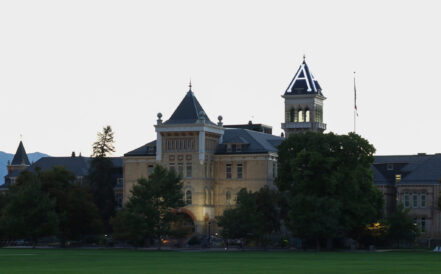Lifetime of achievements: Once nation’s youngest MD, Layton native calls it a career after six decades
- Daniel Christensen is pictured Friday, June 27, 2025.
- Daniel Christensen is pictured circa 1965 when, as a 16-year-old, he was admitted to the University of Utah.
- A Davis News Journal article clipping celebrating Daniel Christensen becoming the nation’s youngest medical doctor at age 22.
Sixty years ago last Saturday, Dan D. Christensen was taking his first steps on what would become a lifelong journey at the University of Utah. It was summer quarter, and the Layton native was about to learn whether he could hack it as a college kid. The rub: Christensen was just 16 years old at the time, hoping to skip his junior and senior years at Davis High School — not to mention that whole diploma thing — and move on with his life.
“Not to degrade it at all, but I mean, high school is kind of rah-rah stuff. You know, you go out and you haze people. You do stupid things,” Christensen told the Standard-Examiner. “I’d done my share of that. But still, I thought, ‘Why should I go back there for two years? If I can do this, I might as well do it.'”
Flash forward to now and, as he enters retirement, it’s safe to say things worked out.
At 19, Christensen began medical school; at 22, he was likely the youngest medical doctor in the nation. From there, he helped organize and foster the early success of the University Neuropsychiatric Institute (now the Huntsman Mental Health Institute), became a pioneer in Alzheimer’s research and traveled the world to share his work as a professor of psychiatry, neurology and pharmacology.
It might not have happened, though, if he hadn’t been given the go-ahead by university leadership. Then-Dean of Admissions Franklin McKean, University President James Fletcher and other administrators had to evaluate whether admitting an actual child to the school was a good idea. In the end, Christensen proved his muster that summer as an admitted visitor, later receiving credit for his coursework.
He was, however, given some conditions for his early acceptance.
“As part of this deal, I committed to report back to them every 10 years,” Christensen said. “I think they wanted to know if they’d made a good decision. They hadn’t done this before, you know.”
The entries in his final report are vast and varied, and Christensen wasted little time in compiling them.
Mere days after completing his residency, Christensen was on faculty at the university. In the early going, he tackled assignments including a role leading consultation-liaison psychiatry at the university medical center.
“Any physician on any floor, surgery, OB-GYN, medicine, who had a psychiatric problem or suspected one with one of their patients, I was called to see,” he recalled. “That was very interesting work.”
He counts later helping to establish the Neuropsychiatric Institute among his proudest accomplishments.
“This was, in some ways, the golden age of psychiatry. There were all kinds of things that were being learned about the brain and new medicines that we’d never had before,” Christensen said. “They asked if I would be the director of the new institute. … So, I got to lead it for 10 years.”
It was there that he began his work in the field of Alzheimer’s, launching a years-long project during which 12 individuals suffering from the disease were monitored. When they died, their brains were donated to the project and studied, and the Neuropsychiatric Institute brain bank was formed.
“There were brain banks all over the place, but there weren’t any brain banks that had this, that had the video documentation of what had happened to that person,” Christensen said. “One of our recordings went on for 20 years.”
Christensen says that the use of data from the project to inform how and what physicians were taught about Alzheimer’s also ranks among his most important contributions. And that work provided the impetus for many of his travels around the world.
The project’s data and recordings were crafted into lectures so compelling that groups around the world invited him to share the findings. So, Christensen did lecture tours throughout Asia and elsewhere, teaching doctors, researchers and others about the disease.
In 2011, the Alzheimer’s Association awarded him with its Lifetime Achievement Award. Christensen also did extensive work in other areas. One project found him researching anterior capsulotomy for the treatment of refractory obsessive-compulsive disorder. Through his involvement, he worked with an older patient who was unable to touch — or, in some cases, even be in the same room with — family members.
“He’d had this problem for 40 or 50 years, and he had this kind of hyper guilt about anything. He couldn’t be in a room with a woman because he’d begin feeling like he’d done something morally wrong. … His wife would tell me these stories. If he were in a room, a daughter-in-law might walk in the room and his anxiety would begin to go and he’d yell out for somebody to come be with him. And he couldn’t get close to his grandchildren,” Christensen said.
“We sent him to Sweden (for treatment). … And it was about eight months later, he sent me a picture of himself with his granddaughter on his lap. For the first time, holding this granddaughter that he had never before touched. That was something to be proud of.”
Christensen worked with a multitude of interesting and prominent people and organizations over the course of his career. He partnered on projects with Nobel Prize winner Mario Capecchi, who made Christensen his personal guest when he received the award in 2007. Megasavant Kim Peek, who inspired Dustin Hoffman’s character in “Rain Man,” was one of his patients.
He also worked briefly with the Utah Jazz and was recognized by Morton’s steakhouse as the first patron to eat at all of the chain’s restaurants worldwide; the trophy he received for the latter accomplishment sits on his desk.
Looking back upon his myriad accomplishments, one would say they constitute an admirable legacy, but Christensen isn’t particularly concerned with how people take stock of him or his work.
“It’s not something that I ever think much about,” he said. “I mean, I’d like to be respected by my family — I think I’ve gotten that at this point. But I know my motives have been good. I don’t try to hurt people. … I suppose, for those who’ve known me, if they know me as a person who tried to do his best and to be helpful, that I pretty much always showed up — I don’t think I ever embarrassed the university or myself — well, that would be a plus.”
Christensen lives in Bountiful; he and his wife raised three daughters.









